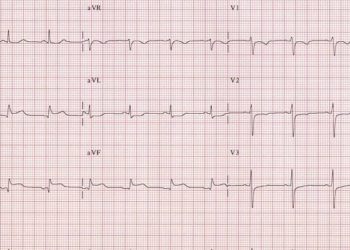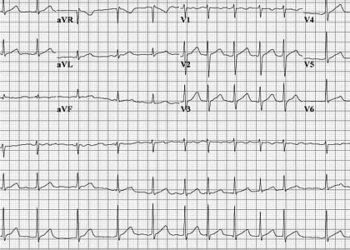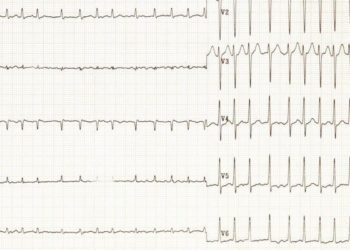Mediterranean diet may reduce risk of cardiovascular disease
Feb 25th – Study groups assigned to eat a Mediterranean diet had fewer composite cardiovascular events than a group assigned to eat a standard low-fat diet.
[tabs tab1=”2MM Rundown” tab2= “2MM Full Report”]
[tab]
Image: CC/PatrickLynch
1. In a study released today, groups assigned to eat a Mediterranean diet had fewer composite cardiovascular events than a group assigned to eat a standard low-fat diet.
2. In adjusted analyses, there was a significant difference between groups for stroke, but not for myocardial infarction.
Published today, the results of this study suggest a possible benefit to eating a diet rich in fish, vegetables, fruits, and essential oils – either from olive oil or nuts. Prior observational studies have suggested such a benefit, but this study is the first randomized controlled trial to explore this question. Interestingly, the study showed a significantly lower rate of strokes in the Mediterranean diet groups, but no significant difference in myocardial infarctions or death from cardiovascular causes. This may suggest that the diet specifically affects stroke risk or that the trial was underpowered to demonstrate a difference in other outcomes. A limitation of this study was that the exposures between groups were not ideally controlled. While patients on the Mediterranean diet received quarterly diet training, patients in the control group initially only had a single diet-training session. However, it was realized that a difference in support between the groups might skew the results; therefore three years after the study began, the control diet group began receiving training sessions at the same frequency as the Mediterranean diet groups. Going forward, it seems evident that eating a diet rich in fish, vegetables, olive oil and nuts is beneficial, but many of the presumed benefits have yet to be fully demonstrated by a prospective study.
Click to read the study in NEJM
[/tab]
[tab]
Image: CC/PatrickLynch
1. Study groups assigned to eat a Mediterranean diet had fewer composite cardiovascular events than a group assigned to eat a standard low-fat diet.
2. In adjusted analyses, there was a significant difference between groups for stroke, but not for myocardial infarction.
This [randomized controlled] study enrolled men and women with no cardiovascular disease, but with at least three risk factors. Patients were randomly assigned one of three diets: a Mediterranean diet supplemented with olive oil, a Mediterranean diet supplemented with nuts, or a standard “low-fat” diet. The Mediterranean diet consisted largely of fish, poultry, fruits, vegetables and nuts. The primary end point was a composite of myocardial infarction, stroke, and death from cardiovascular causes. After 4.8 years, the trial was stopped. It was found that patients assigned to either Mediterranean diet had a 30% lower rate of events in the composite end point. However, further analysis showed that this difference was only accounted for by the difference in rates of stroke – there was no significant difference in myocardial infarction or death from cardiovascular cause.
In sum: Published today, the results of this study suggest a possible benefit to eating a diet rich in fish, vegetables, fruits, and essential oils – either from olive oil or nuts. Prior observational studies have suggested such a benefit, but this study is the first randomized controlled trial to explore this question. Interestingly, the study showed a significantly lower rate of strokes in the Mediterranean diet groups, but no significant difference in myocardial infarctions or death from cardiovascular causes. This may suggest that the diet specifically affects stroke risk or that the trial was underpowered to demonstrate a difference in other outcomes. A limitation of this study was that the exposures between groups were not ideally controlled. While patients on the Mediterranean diet received quarterly diet training, patients in the control group initially only had a single diet-training session. However, it was realized that a difference in support between the groups might skew the results; therefore three years after the study began, the control diet group began receiving training sessions at the same frequency as the Mediterranean diet groups. Going forward, it seems evident that eating a diet rich in fish, vegetables, olive oil and nuts is beneficial, but many of the presumed benefits have yet to be fully demonstrated by a prospective study.
Click to read the study in NEJM
By Akira Shishido and Mitalee Patil
More from this author: Pneumocystis linked to sudden infant deaths, Continuous infusion of beta-lactams may be superior to bolus therapy, Novel antiviral drug reduces influenza viral load, Three months of antibiotics appear to effectively treat early-onset spinal implant infections, [Physician Comment] Recurrent early Lyme disease is caused by reinfection, not relapse, Hospital Acquired MRSA pays no attention to vancomycin effectiveness, Oseltamivir treats avian flu early, Linezolid treats Chronic Extensively Drug-Resistant TB but has a high incidence of adverse effects, Intermittent and continuous antiretroviral therapies are equivalent in the treatment of acute HIV-1 infection, Peginesatide is noninferior to epoetin for anemia in hemodialysis patients [EMERALD Trials], Antibiotics improve outcomes in severe acute malnutrition
© 2013 2minutemedicine.com. All rights reserved. No works may be reproduced without written consent from 2minutemedicine.com. Disclaimer: We present factual information directly from peer reviewed medical journals. No post should be construed as medical advice and is not intended as such by the authors or by 2minutemedicine.com. PLEASE SEE A HEALTHCARE PROVIDER IN YOUR AREA IF YOU SEEK MEDICAL ADVICE OF ANY SORT. Content is produced in accordance with fair use copyrights solely and strictly for the purpose of teaching, news and criticism. No benefit, monetary or otherwise, is realized by any participants or the owner of this domain.
[/tab]
[/tabs]






